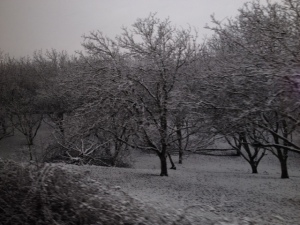 I have ashes smeared on my forehead. They were placed there with the words, “Remember that you are dust, and to dust you shall return.”
I have ashes smeared on my forehead. They were placed there with the words, “Remember that you are dust, and to dust you shall return.”
It is a good spiritual practice to live fully, whole-heartedly, remembering that we, along with everyone we love, will die.
But that is not the main reason Ash Wednesday is my favorite liturgy in the Episcopal Church. Since my first trip to Haiti, the service for this first day of Lent had a special place in my heart. It is the only time when the Episcopal community asks for forgiveness for our cultural sins.
This week, confession and asking for forgiveness as a nation feels particularly important.
Yesterday, I went to an Oregon Humanities Conversation Project talk on “Alternatives to Incarceration,” led by Walidah Imarisha. I learned disturbing statistics. Our prison population has increased 370% since 1970 (when I was in high school). If it hadn’t been for the “War on Drugs,” 70% of the people now in prison would NOT be there. We lock up more of our citizens than any other country in the world. Ironically, the amount of violent crime today is similar to what it was in 1950 (four years before I was born).
Incarceration is just one hot issue. If I started to list all of the cultural sins that are rampant in our world right now, I’d be writing for a very long time. With such a heavy heart, I headed to church on this Ash Wednesday to join my voice to others praying for forgiveness:
We confess to you, Lord …
Our self-indulgent appetites and ways, and our exploitation of other people …
Our intemperate love of worldly goods and comforts. …
Accept our repentance, Lord, for the wrongs we have done:
For our blindness to human need and suffering, and our indifference to injustice and cruelty …
For our prejudice and contempt toward those who differ from us,
For our waste and pollution of your creation, and our lack of concern for those who come after us. … 1
These words of confession spoke the things I so long to address in my life and in the world. Often Christians focus on personal sin but ignore institutional and organizational sin that we all participated in together.
Not me.
Not today.
I ask for forgiveness for myself and for my country. That is the first step toward transformation.
1 “Ash Wednesday Liturgy,” The Book of Common Prayer, (New York: Seabury Press, 1979), page 268